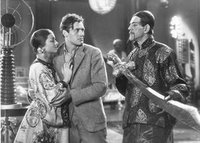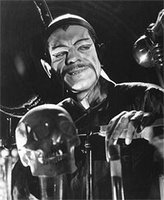 For casual moviegoers living in a world of 200 million dollar blockbusters, IMAX 3-D theaters, entire movies animated by computers, even films from just 30 years ago may be hard to accept, let alone movies from 60 and 70 years ago. The need to suspend disbelief is greater for these films; you're not just accepting what fantastic elements may appear, you have to accept the patter of language, the play of shadow and light in the various black and white worlds the movies inhabit. Without this suspension, this willingness to allow yourself to become engrossed in the flicker of a bye gone era, you only see the scratches in the film, the painted backdrops, the zipper in the costume.
For casual moviegoers living in a world of 200 million dollar blockbusters, IMAX 3-D theaters, entire movies animated by computers, even films from just 30 years ago may be hard to accept, let alone movies from 60 and 70 years ago. The need to suspend disbelief is greater for these films; you're not just accepting what fantastic elements may appear, you have to accept the patter of language, the play of shadow and light in the various black and white worlds the movies inhabit. Without this suspension, this willingness to allow yourself to become engrossed in the flicker of a bye gone era, you only see the scratches in the film, the painted backdrops, the zipper in the costume.But let yourself fall into the rhythms of this celluloid world, and you see something else entirely.
 I grew up with this mentality. Many of my earliest memories (outlined here in a previous post) center around watching movies with my father, who came to America when he was a child and devoured the films of Humphrey Bogart, Cary Grant, Errol Flynn. Watching those films with me was a way for him to remember one of the few joys of his childhood (growing up a German immigrant only 10 years after WWII wasn't the easiest thing to do). And maybe part of the love I have for watching older movies is the memory it brings of my own childhood, laying down with my head crooked in his elbow as we were both dazzled by what played on the television.
I grew up with this mentality. Many of my earliest memories (outlined here in a previous post) center around watching movies with my father, who came to America when he was a child and devoured the films of Humphrey Bogart, Cary Grant, Errol Flynn. Watching those films with me was a way for him to remember one of the few joys of his childhood (growing up a German immigrant only 10 years after WWII wasn't the easiest thing to do). And maybe part of the love I have for watching older movies is the memory it brings of my own childhood, laying down with my head crooked in his elbow as we were both dazzled by what played on the television.So it's an early Sunday morning in late October 2006. I pop in THE MASK OF FU MANCHU, curl up with the coffee I picked up at 7-11, and promptly fall back 30 years.
FU MANCHU is really more action than horror; think of it as a precursor to RAIDERS OF THE LOST ARK. The British government hires a group of adventurers in a race against time to recover the lost tomb of Genghis Khan. The rush? It's also being sought by the fiendish Fu Manchu, deliciously played by Boris Karloff. Fu Manchu believes that by obtaining the relics found inside the tomb, namely the Golden Mask, he will become the reincarnation of Khan and be able to rally the Asian countries behind him in a bid for world domination.
 The more I see of Boris Karloff, the more I appreciate just how brilliant an actor he was. It doesn't matter how much make-up is caked on, how bad the dialog is: once he appears on screen you are completely riveted. And his first appearance in FU MANCHU is a doozy: a close-up of him in full Asian makeup, in his lab. A distorted mirror immediately to his left twists and amplifies his face, displaying his dual nature as genius scholar and mad torturer. Both sides of his personality appear early on - upon capturing the heroine's father he reminds him that he should be addressed as "Doctor" after listing his educational background. The torture of this same man later further shows his mad brilliance: the father is strapped under a large bell that constantly chimes; when thirsty, Fu Manchu brings him water, but it's filled with salt.
The more I see of Boris Karloff, the more I appreciate just how brilliant an actor he was. It doesn't matter how much make-up is caked on, how bad the dialog is: once he appears on screen you are completely riveted. And his first appearance in FU MANCHU is a doozy: a close-up of him in full Asian makeup, in his lab. A distorted mirror immediately to his left twists and amplifies his face, displaying his dual nature as genius scholar and mad torturer. Both sides of his personality appear early on - upon capturing the heroine's father he reminds him that he should be addressed as "Doctor" after listing his educational background. The torture of this same man later further shows his mad brilliance: the father is strapped under a large bell that constantly chimes; when thirsty, Fu Manchu brings him water, but it's filled with salt.And if you think Karloff is evil as Fu Manchu, wait until you see a young Myrna Loy (later to be Nora Charles in the excellent THIN MAN series) as his diabolical daughter. Watch the look on her face as she screams "Faster! FASTER!!" as her servants whip the young hero, who has been captured after being tricked into delivering the sword and mask into Manchu's hands. For a glimpse of the makeup used to transform Loy into her character, see below:
 Mummy attacks, evil laboratories, exotic locations and ancient artifacts - everything here for a great time. FU MANCHU may be suffer slightly for falling under the shadow of Karloff's other horror movie to come out the same year (some obscure film called FRANKENSTEIN), but there's a lot of fun and whimsy on display here, even if it's more an adventure film that an outright horror film.
Mummy attacks, evil laboratories, exotic locations and ancient artifacts - everything here for a great time. FU MANCHU may be suffer slightly for falling under the shadow of Karloff's other horror movie to come out the same year (some obscure film called FRANKENSTEIN), but there's a lot of fun and whimsy on display here, even if it's more an adventure film that an outright horror film.But none of that really mattered to me. Because while the movie played its lights across the room, I was 7 years old again, curled up with my dad again, enchanted as I always was, and probably always will be.
No comments:
Post a Comment